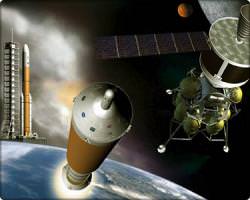As the space shuttle program winds down and NASA transitions to the new Constellation program, more than 8,000 NASA contractor jobs in the manned space program could be eliminated after 2010, the U.S. space agency said at a press briefing on April 1, 2008. A NASA report sent to Congress predicts that between 5,700 and 6,400 jobs will be lost at the Kennedy Space Center, where the shuttle processing takes place, before 2012. After that time, a few hundred jobs will be added yearly as the new moon-landing program gets started, with the first Constellation launch tentatively scheduled for 2015. Some NASA managers believe that an update to Tuesday's report, which is due to Congress in six months, won't be quite so bleak, but NASA said it could be more than a year before it has more dependable job forecasts.
The most dramatic job cuts will be among private contractors. Bill Gerstenmaier, NASA associate administrator said that the estimates of job losses were preliminary and they do not take into account numerous factors of potential workload. "Don't overreact to these numbers,'' he said.
The report stated "Our (NASA’s) greatest challenge over the next several years will be managing this extremely talented, experienced and geographically dispersed workforce as we transition from operating the space shuttle to utilizing the International Space Station.â€
Nationally, NASA said the number of full-time civil servants in its manned space program would fall to about 4,100 in 2011, a loss of about 600 jobs from this year. Including outside contractors, the number of jobs would fall to an estimated 12,500 to 13,800. About 21,000 are currently employed.
Rick Gilbrech, NASA associate administrator for exploration systems, said that many future contracts for the Constellation program to develop the new moon rockets and spacecraft to replace the shuttle fleet, could improve the local NASA jobs picture.
"There's a lot of work that's not folded into these numbers," he said.
Gilbrech added that the next U.S. president and Congress might not support the Constellation program, which is President Bush's vision for returning to the moon and going on to Mars.
"We do need stable support and long-term commitment," he said.
KSC Director Bill Parsons said Tuesday he estimates the center's 15,000 on payroll will drop to 10,000 people in the next few years before starting to climb slowly. He said, however, that there is hope that layoffs might be rare because up to one-third of KSC workers are eligible to retire before or around the time that the shuttle program ends in 2010. He does not expect workers to abandon their jobs for new careers before then.
"This is not a work force that panics," he said, referring to the recovery from two shuttle accidents.
Retirement will provide a easier transition for some. However, younger workers may have to redirect their careers into the Constellation program. Those caught in the middle might have to learn new skills or relocate to avoid being laid off. There are also other ripple effects to other non-technical support jobs.
Original News Sources: Space.com,
Florida Today
 Universe Today
Universe Today
